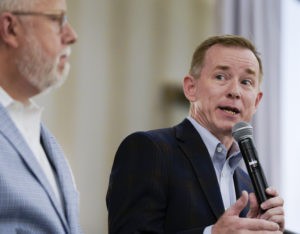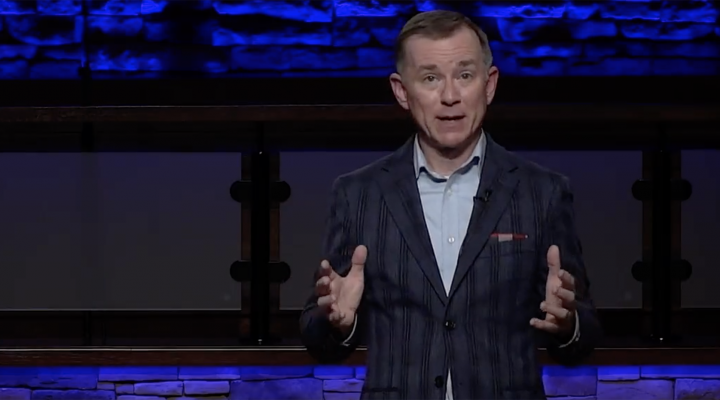A Georgia pastor who has been a standard bearer for the most conservative wing of the Southern Baptist Convention will make a second run to become SBC president at this June’s annual meeting in New Orleans.
Mike Stone, pastor of Emmanuel Baptist Church in Blackshear, Ga., is a former chairman of the powerful SBC Executive Committee. He came under intense criticism for his role in mishandling knowledge of sexual abuse cases in the SBC, which prompted an independent investigation.

Mike Stone speaks during an event at the SBC annual meeting in June 2021, while Ed Litton looks on. Litton defeated Stone in a run-off election for SBC president. (Baptist Press)
Stone narrowly lost a bid to become SBC president in 2021, defeated by a more centrist candidate, Alabama pastor Ed Litton. The next year, the candidate supported by the same ultra-conservative forces that backed Stone — Tom Ascol — lost by an even greater margin to Bart Barber, pastor of a small Texas church and an institutional loyalist.
To date, Barber is the only other announced candidate for the presidency this year. According to SBC bylaws and tradition, presidents serve one-year terms but are eligible to serve two consecutive terms. Most — but not all — presidents over the past 40 years have served two terms and are usually re-elected without opposition.
Two years ago, after losing the presidential race, Stone filed suit in federal court against Russell Moore, former head of the SBC Ethics and Religious Liberty Commission. Stone accused Moore of three violations: defamation by libel, false light invasion of privacy, and intentional infliction of emotional distress. He sought $750,000 in damages, some of which would be to recoup the honorariums Stone said he would not receive by speaking in other churches since he was not SBC president and had been cast in a negative light by Moore’s actions.
Stone later withdrew the suit, explaining he trusts God to take care of him and judge the matter.
This time, Stone announced his candidacy April 26 via video posted to Twitter by his friend Mac Brunson, pastor of Valleydale Church in Birmingham, Ala.
Stone declares in the video the SBC is on an “unsustainable trajectory” and needs intervention. His motto appears to be “unsustainable is unacceptable.”
His motto appears to be “unsustainable is unacceptable.”
“There’s a lot to celebrate in the SBC, from church planting to international missions and beyond,” he says. “And while I have no desire to disparage anyone, there are also serious causes of grave concern.”
He cites two: The need for “a biblical approach to the horrific issue of sexual abuse” and avoiding “financial ruin.”
Addressing sexual abuse should be a local congregational matter, he suggests, with the national denomination providing needed resources to help congregations “deal with these matters legally and compassionately.”
In an insider’s play on words, Stone declares: “We need leaders who will guide us to care well for victims while at the same time embracing scriptural principles of due process and the handling and publishing of accusations.”
“Caring Well” was the theme of the ERLC conference organized by Russell Moore that Stone and his allies opposed. The new SBC initiative created in response to last year’s investigation of the Executive Committee is also called Caring Well.
The Executive Committee already has spent millions of dollars on the investigation and on projects and settlements in response to the investigation.
“The latest audit from your Executive Committee says we are on an unsustainable financial trajectory,” Stone says. “Now to be clear, people are infinitely more valuable than financial resources, but we can address this issue wisely in a way that doesn’t lead us into financial ruin for Southern Baptists. Unsustainable should be unacceptable.”
The answer to these problems, he contends, is to reemphasize “our heartfelt commitment to take the gospel of Jesus Christ across America and around the world.”
Thus, if elected president, Stone says he will place a “major focus” on a “nationwide evangelism emphasis called Crossover America.”
“We can deal rightly with the abuse issue while staying on mission for Christ.”
He added: “We can deal rightly with the abuse issue while staying on mission for Christ.”
Given the institutional structure of the SBC, the president has limited power to advance any denomination-wide emphasis without the voluntary cooperation of the agencies and institutions that are run by their own presidents and trustee boards. Stone has not endeared himself to those gatekeepers in the past, as evidenced by his assertions that the denomination is on the wrong course.
Last year’s theme of the Conservative Baptist Network that supported Ascol was “Change the Direction.”
Stone’s church, which averaged 975 in weekly worship last year and collected $2.4 million in undesignated receipts, gave nothing to the SBC’s unified budget last year. For decades, giving to the Cooperative Program has been an important measure of a presidential candidate’s qualification to serve. The current crop of conservatives who took control of the SBC beginning in 1979 sometimes were criticized for the same lack of giving as they sought power.
According to published reports, Emmanuel Baptist Church dropped its Cooperative Program giving from $226,000 in 2020 to zero in 2022. In 2021, the year Stone was defeated in his bid for the presidency, the church gave $54,000.
Last year, the Georgia church gave $36,000 directly to the SBC International Mission Board.
Related articles:
Mike Stone drops defamation suit against Russell Moore, claiming God will judge
‘Southern Baptist whistleblower’ offers audio clips to back Russell Moore’s claims


